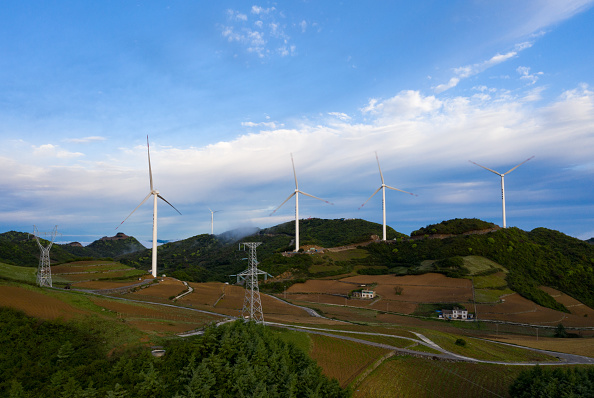
Editor's note: Freddie Reidy is a freelance writer based in London. He studied history and the history of art at the University of Kent, Canterbury, specializing in Russian history and international politics. The article reflects the author's opinions, and not necessarily the views of CGTN.
It is somewhat illustrative of the thwarted ambition of 2020 that the venue for what was supposed to be the Glasgow 2020 Cop-26 UN Climate Conference is instead a COVID-19 overflow hospital. However, in spite of the global pandemic, and perhaps in part due to it, there is cause for global optimism in the pursuit of arresting rising global temperatures.
The five-year anniversary of the Paris Climate Accord was marked last week with an online conference, the Climate Ambition Summit. While only a short, online summit with little fanfare, it did add to the growing momentum ahead of COP-26 in November of 2021.
Where the Paris agreement had hinged on a landmark commitment from China and the United States, the Ambition Summit was noted for the absence of the U.S. with President Trump having announced a withdrawal in 2017.
However, despite such a significant setback, President-elect Joe Biden has signaled his intent to re-join the accord while declaring his ambition that the U.S. creates a "carbon and pollution-free power sector" by 2035.
Of perhaps, the even greater significance and surprise in some quarters was Chinese President Xi Jinping's announcement this year that China would become carbon neutral by 2060. Such an undertaking by the world's two largest economies is of paramount importance and significance in preventing temperatures rising in excess of two degrees Celsius.
COVID-19 has presented governments with an opportunity to accelerate environmentally friendly policies. The financial intervention required to counter the pandemic has created an opening for massive infrastructure projects and public sector spending which many more conservative governments are often opposed to. And in turn, they are are stimulating stalling economies with long term benefit.

The wind turbines generate electricity in Zigui County, Hubei Province, China, May 10, 2020. /Getty
The wind turbines generate electricity in Zigui County, Hubei Province, China, May 10, 2020. /Getty
In the UK for example, host of the COP-26 conference, Prime Minister Boris Johnson has announced a "green industrial revolution" creating over 250,000 jobs. With projects aimed at boosting renewable energy solutions, building on the successes which gave rise to the largest offshore wind farms in the world.
Johnson argued that the development of vaccines in China, Europe and Russia has also demonstrated the ability to overcome global challenges when presented with a collective threat. "Together we can use scientific advances to protect our entire planet – our biosphere – against a challenge far worse, far more destructive than even the Coronavirus," the PM said.
While the 2006 Stern Review identified the economic gain of tackling climate change vs. ignoring or adapting to its impact, multilateral solutions are essential. However, with legal underpinnings to climate goals, there is a potential for manipulation that could benefit some economies over others.
Japan has committed to carbon neutrality by 2050, but it has expressed concern that climate objectives set by the European Union could be used as a smoke screen for protectionist policies. In the field of automotive, Japan is a world leader in hybrid technology. But the EU has signaled that it will legislate to ban all petrol and hybrid vehicles in future, leaving electric-only vehicles as the only option regardless of the ultimate carbon footprint; all-electric vehicles being the favored strategy of Europe's BMW, PSA and the VW Group.
"We are so afraid that [rules] stipulated, regulated and decided by the EU will become the global standard," said Takeshi Niinami, CEO of Suntory Group and member of Japan's council on economic and fiscal policy.
The UK has ramped up its own objectives aimed at a 68-percent reduction of carbon by 2030 vs. 55 percent for the EU. China's aim might look more modest, but the pace required to attain China's own target will require far more ambitious and aggressive restructuring. Charles Michel may proclaim that "Europe is the leader in the fight against climate change," but as Greenpeace's Sebastian Mang pointed out, "The evidence shows that this deal is only a small improvement on the emission cuts the EU's already expected to achieve."
These disparities pose a significant challenge to the UK and UN when building a framework for COP-26 that acknowledges individual and regional requirements and places them within a wider environmental impact assessment.
Meanwhile, former Bank of England governor, Mark Carney, has been promoting the economic advantages of a "green fightback" and this view has been the biggest ideological evolution since Paris. Where once environmental policies were viewed as a drain on resources, they are now seen as an economic opportunities. A view articulated by Boris Johnson as a statement of intent ahead of Cop-26, "Our actions as leaders must be driven not by timidity or caution, but by ambition on a truly grand scale."
(If you want to contribute and have specific expertise, please contact us at opinions@cgtn.com.)

